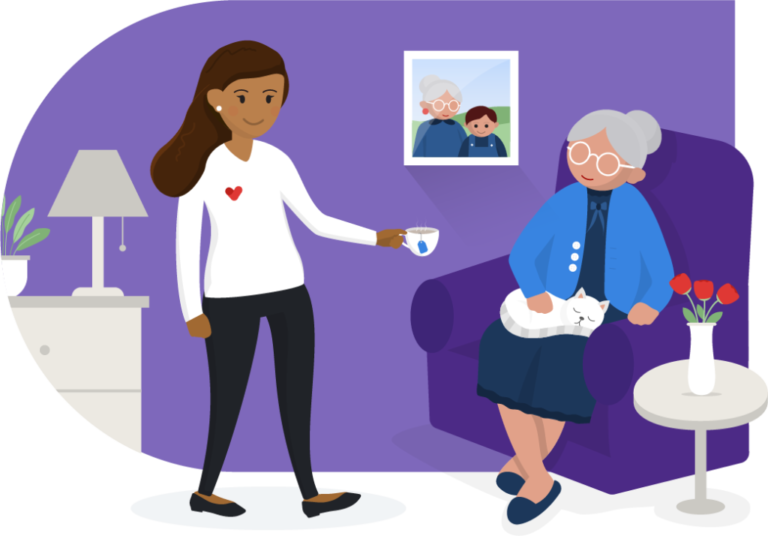
Choosing the right type of senior care for a loved one is one of the most important—and often overwhelming—decisions...

Choosing the right type of senior care for a loved one is one of the most important—and often overwhelming—decisions a family can make. With so many options available, from home care to assisted living and memory care, how do you know which senior care setting is the best fit?
At Elder Answers, we know this decision comes with emotional and financial weight. That’s why we’ve put together this comprehensive guide to help you understand the different types of senior care and how to choose the right one based on your loved one’s needs, preferences, and budget.
Let’s start by outlining the most common types of senior care available today. These options fall into two general categories:
In-home care services
Senior living communities
What it is: Home care provides assistance with daily living tasks while your loved one remains in their own home. It can range from a few hours a week to 24/7 live-in care.
Who it’s for:
Seniors who want to age in place
Individuals with relatively mild to moderate care needs
Those recovering from surgery, illness, or injury
People needing temporary or long-term help with personal care
Types of support:
Personal care (bathing, dressing, grooming)
Light housekeeping and meal preparation
Companionship
Medication reminders
Skilled nursing or therapy (via home health care agencies)
Cost: Varies by hours of care needed. On average, expect $36–$46 per hour in California. Home care can be more cost-effective for part-time needs but more expensive than assisted living for full-time care.
Benefits:
Comfort of staying at home
Personalized one-on-one support
Flexible schedules
Lower disruption to routines and independence
Consider when:
Your loved one needs limited assistance
They’re safe at home with some supervision
You want to supplement family caregiving without full-time relocation
What it is: Independent living is for active older adults who don’t need personal care or medical services but want a more maintenance-free lifestyle in a social community setting.
Who it’s for:
Seniors typically aged 65+ who are independent
Those looking to downsize or live in a more manageable environment
Individuals wanting access to meals, activities, and amenities
Services provided:
Housekeeping and laundry
Dining plans
Social activities and outings
Fitness and wellness programs
Transportation services
Cost: Varies by location and amenities, but generally ranges from $4,00 to $6,000 per month.
Benefits:
Built-in social life and community
No more home maintenance or chores
Safe environment with optional services
Opportunities to stay active and engaged
Consider when:
Your loved one is independent but wants simplicity and community
There’s no need for help with personal care
Isolation at home is affecting their mental or emotional well-being
What it is: Assisted living provides housing, meals, and help with activities of daily living (ADLs) such as bathing, dressing, and medication management, in a community setting.
Who it’s for:
Seniors who need some support but not 24/7 medical care
Those who can no longer live safely alone
Individuals with mild cognitive decline or mobility issues
Services provided:
Personal care assistance
Three meals a day
Housekeeping and laundry
Social programs and events
Transportation
Medication management
Cost: Typically ranges from $5,500 to $8,500+ per month depending on care level and location.
Benefits:
Promotes independence with a safety net
Tailored care plans
Social opportunities and structured activities
Staff available 24/7
Consider when:
Your loved one struggles with ADLs or medication
They’re isolated or unsafe living alone
You want a long-term care option without the hospital feel
What it is: Memory care communities are specialized environments within assisted living or standalone facilities designed for individuals with Alzheimer’s or other types of dementia.
Who it’s for:
Seniors diagnosed with memory loss conditions
Those who require a secure, structured setting
Families who need professional support for dementia-related behaviors
Services provided:
All assisted living services, plus:
Secure environments to prevent wandering
Cognitive and sensory programming
Specialized staff trained in dementia care
Cost: Often $1,500 to $4,000 more per month than assisted living—around $7,500 to $12,000+ depending on the level of care.
Benefits:
Staff specially trained in dementia support
Calm, predictable environment
Purpose-built design for safety and engagement
Peace of mind for families
Consider when:
Your loved one has been diagnosed with dementia or Alzheimer’s
They’re becoming confused, anxious, or unsafe at home
You’re unable to provide the level of supervision and structure needed
What it is: These are smaller, home-like settings (often in residential neighborhoods) that provide non-medical personal care to a small group of residents (usually 6 or fewer in California).
Who it’s for:
Seniors who prefer a quieter, more intimate setting
Those who need help with daily living but not medical care
Individuals who may be overwhelmed by large assisted living facilities
Services provided:
Personalized care and supervision
Meals, laundry, and housekeeping
Activities suited to individual preferences
24/7 caregiver support
Cost: Generally $6,500 to $10,000 per month in California, depending on location and services.
Benefits:
Higher caregiver-to-resident ratio
Familiar, home-like environment
Often more flexible and personalized care
Easier transitions for seniors with anxiety or dementia
Consider when:
Your loved one needs more hands-on care but doesn’t want a large facility
You prefer a quiet, residential setting
Memory care or assisted living is too overwhelming or impersonal
Now that we’ve outlined the main types of senior care, how do you decide which is the best fit for your family?
Here are the most important considerations:
Start by evaluating your loved one’s current and future care needs:
Are they independent, or do they need help bathing, dressing, or walking?
Do they have a chronic health condition or cognitive impairment?
Do they require specialized care (e.g., dementia or Parkinson’s care)?
Tip: Ask for a care needs assessment from a professional senior care advisor or home care agency. Elder Answers can help with this at no cost.
Costs can vary significantly depending on the type of care. Consider:
Monthly budget
Long-term affordability
Whether your loved one qualifies for long-term care insurance, VA Aid & Attendance, or Medi-Cal (in California)
Tip: Home care can be more cost-effective short term, while assisted living and board and care homes can be more affordable for full-time care needs.
Think about what environment would make your loved one feel most at ease:
Do they value privacy or social activity?
Would they thrive in a lively senior community or a quiet home-like setting?
Are they open to moving, or is staying at home essential?
Being close to family can make a big difference in quality of life and peace of mind. Consider:
How often you’ll be able to visit
Whether the care option is located in or near your community
The availability of quality options nearby
Not all care providers are created equal. Look for:
Proper licensing and certifications
Caregiver-to-resident ratios
Cleanliness, safety, and resident happiness
Online reviews and personal referrals
Tip: At Elder Answers, we’ve personally vetted dozens of senior care communities and board and care homes to help families find trustworthy options.
Choosing senior care isn’t just about today’s needs—it’s about planning for what’s next. Here’s how to approach the decision with confidence:
At Elder Answers, we specialize in helping families like yours find the best senior care in San Diego and across California. Whether you’re considering home care, assisted living, or board and care homes, our local advisors offer unbiased guidance—completely free of charge.
If you’re not sure where to start, give us a call. We’ll walk you through your options and help you find senior care that truly feels like home.

Choosing the right type of senior care for a loved one is one of the most important—and often overwhelming—decisions...

Caring for an aging loved one is a journey filled with love, patience, and dedication. However, when memory-related issues...

In 2025, the cost of in-home care continues to be a critical factor for families seeking senior caregiving services....

As our loved ones age, their care needs often change, and navigating the world of senior care facilities can...